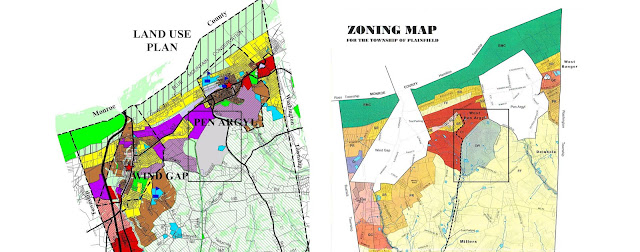In 1988, Plainfield Township's Solid Waste zoning district was created, as a result of a request by Grand Central Sanitary Landfill to increase its size. Thus involved many months of study by a Study Group of citizens and interested parties, with the advice of professional consultants. Many residents did not want the landfill to be expanded. The end result was that a significantly larger area than the landfill requested was zoned for solid waste, to allow for future expansions. The principal cited by counsel was that the landfill should be able to expand until a "Fair Share" of land area was used - at which point the township would not be obligated to allot further space for a landfill. The township's Comprehensive Plan reflects the area planned for solid waste, and the solid waste zoning district has identical boundaries as shown on the Zoning Map:

At the July 2020 hearing at which the Plainfield Township BOS rejected the landfill's request to rezone farmland to solid waste, "Fair Share" was cited by Supervisor Mellert, who served on the Study Group in 1987-1988. In essence, the argument is that Plainfield Township has done its fair share in providing for the disposal of solid waste for Northampton County residents. It should be noted that Waste Management is not winning as many contracts for hauling waste from local communities, and a large percentage of waste being disposed of in GCSL is coming from NY and NJ. There is no need to pay the costs for drivers and trucks for out of state garbage. A fair question is why our community should bear the burden of disposing of out of state garbage, if the argument is that
our garbage must go somewhere. I proposed during a hearing for rezoning last year that GCSL adopt a policy of "no out of state solid waste disposal," which would extend the life of the landfill several years and not make rezoning necessary. No regulatory agency can mandate this, but the landfill owner can.
A sludge plant was proposed in 2016 on a few acres of the remaining useable land in the solid waste district, which has not yet been consumed by the landfill. But Synagro, the company that would have leased the land, could not prove that it would not impact ground and surface waters that were less than 100 feet from the proposed plant. The sludge plant is a permitted use in the solid waste district.
Waste Management's plan a few years ago was to add a sludge plant to the GCSL property, and then it would have requested the solid waste district expansion so that it could operate a new landfill - a request that should be done five years prior to anticipated closure in 2028. The sludge plant would have supplied 84% of its energy needs using waste heat from Green Knight's Energy Center. It stands to reason that in the future, if Waste Management's request to rezone 211 acres of land that it is under contract to purchase were granted, Waste Management might return to the concept of hosting a sludge plant. The waste heat could be utilized - and Waste Management would also benefit from leasing the land.
A landfill spokesperson has represented in the last few weeks that it is wrong to assume that a sludge plant is coming, since Synagro made clear that it will not continue to pursue its proposal. Furthermore, she stated that Waste Management would agree to a provision to not host a sludge plant as a condition of having a new landfill permit granted. The main problem with these statements is the rezoning request has already been denied. Just as important - rezoning would have to happen prior to consideration of a Land Development Plan, and once rezoned Waste Management would by right be entitled to pursue in addition to a landfill all permitted uses on its property, including a sludge plant. This right can not be nullified by a condition on a development plan, and a pledge to place such a condition on a hypothetical plan is not binding.
A competitor of Synagro could propose a plant, or Synagro could return at some point. Business is business, and land ownership entitles the owner to rights enforceable by legal precedent. Township Solicitor Backenstoe stated at the October BOS meeting, "I would never advise this Board to agree to rezone property, based on a pledge that a permitted use would not be pursued in the future on the rezoned land. All kinds of things could happen - plans change, property ownership can change."
If an expansion were to occur, which I oppose, voters should know that if elected I would advocate to for terms more favorable to our residents. A landfill spokesperson stated when the rezoning request was announced that the landfill is already paying more than the law requires in tipping fees, but this community is not getting back benefits commensurate with the impacts to our environment and quality of life.



Comments
Post a Comment